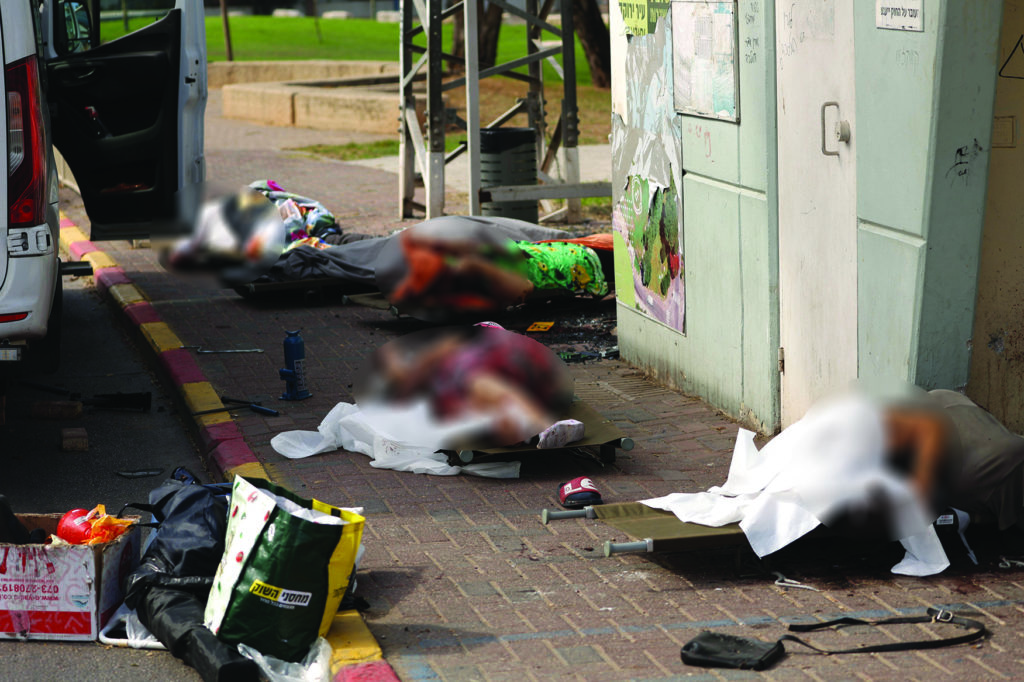IN THE MEDIA
100 days on, the trauma has not dissipated
January 15, 2024 | Colin Rubenstein

Canberra Times – 15 January 2024
One hundred days have passed since October 7, the darkest day in Israel’s history, when Hamas – the genocidal terror group that controlled the Gaza Strip – broke a ceasefire and launched an unprovoked invasion of southern Israel. In 22 communities, terrorists massacred hundreds of unarmed civilians, torturing many of them first, brutally raped women before in most cases murdering them and took hundreds of men, women and children as hostages to Gaza. There, many suffered severe abuse before being released, while more than 120 others still languish today under what are likely unimaginable conditions.
Despite the more than 13,000 rockets and mortars fired at Israeli towns and villages from Gaza since Hamas seized control of the Gaza Strip in a bloody coup back in 2007, few Israelis had ever previously thought they could be so vulnerable to an enemy of such unrestrained barbarity. By the end of the day, 1,200 Israelis lay dead – most Jewish, but also including Muslims, Christians and others. It was the greatest single-day loss of Jewish life since the Holocaust. The ongoing plight of the hostages only deepens this trauma. These events left a collective and still unhealed scar on not just the seven million Jews of Israel but Jews the world over.
For Israelis then, October 7 was cataclysmic and transformational, like September 11, 2001 was for the US, only more so. There is a broad consensus that Israel cannot allow itself to return to the vulnerability of the status quo on October 6 – especially as Hamas leaders publicly stress their plans to repeat October 7 “again and again.” Israelis almost all agree the current war against Hamas in Gaza, with the goal of ending Hamas rule there, is a war of ein brera, “no choice” in Hebrew.
Polls shows these beliefs have not flagged even as that war has proved bloodier, harder and more costly than most expected.
IDF forces have had to fight to gain control over a densely-populated terror statelet that Hamas assiduously built up over the past 16 years, with extensive military infrastructure found in every civilian neighbourhood and refugee camp.
The biggest problem is of course Hamas’ vast underground tunnel network – estimated to span 500km, with shafts exiting under residential buildings, hospital compounds and schools and equipped with bunkers, generators and months of supplies. It has been estimated some 6,000 tons of concrete and 1,800 tons of steel would have been needed to construct it – enough to build 16 towers as high as Dubai’s Burj Khalifa Tower, the tallest building in the world.
The existence of this vast tunnel network has meant IDF troops have had to advance slowly, methodically and with great caution, knowing that behind each hill or inside any school or home, there could be a tunnel entrance from which Hamas terrorists could quickly emerge to ambush them.
It has also meant a devastatingly costly conflict for the Gazan civilians who live and work in the neighbourhoods interwoven and undermined by Hamas’ terror tunnel network and other military infrastructure and assets. Israelis are very aware of the Gazan civilian casualties and most agree that the IDF should seek to minimize them, even at some risk – for instance by issuing warnings before attacks and creating evacuation corridors. However, they also know Hamas is ultimately legally and morally responsible for starting this war and using Gazans as human shields – a war crime.
Meanwhile, the threat is not from Gaza alone. Hamas is armed, funded and trained by Iran – which has other proxies that would also like to repeat October 7.
The most dangerous is Hezbollah – entrenched just across Israel’s border with Lebanon, and signalling its solidarity with Hamas by launching cross-border attacks virtually every day since October. There is a real danger of a full-scale second war against Hezbollah unless a diplomatic agreement to push Hezbollah back from the border is found.
Many Australian Jews, like Jews around the world, were directly affected by October 7 and its aftermath – for instance, knowing someone who was killed on that day or had a relative taken hostage, or having ties to one of the hundreds of thousands of Israelis who still cannot return to their home in northern or southern Israel.
We have felt the ripples here too, through often violent demonstrations and the explosions of online and offline antisemitism which began even before Israel began responding to the attack of October 7. Many Australian Jews are reporting that, for the first time in their lives they are finding themselves having to confront blatant and unprecedented antisemitism of a sort never previously experienced.
A hundred days may have passed but the trauma has not dissipated with the passage of time – for Israel, or for most Jews around the world.
The Jerusalem Post’s David Brinn wrote poignantly on New Year’s Day, “In Israel, it’s not January 1st. It’s October 86th.” Today is October 107th in Israel – and Israel will continue to live in the aftermath of October 7 until the current war ends with an outcome that removes the existential crisis created that day.





